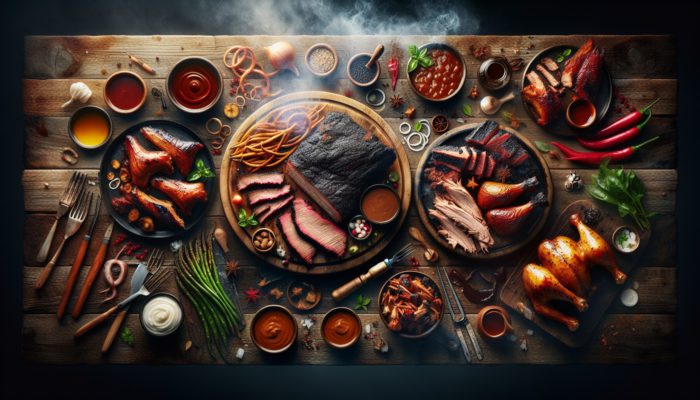Unlock the Secrets to Selecting the Ideal BBQ Meat
Deciding Between Beef, Pork, and Chicken for Your Ultimate BBQ Experience

Selecting the most suitable meat for your BBQ extravaganza plays a pivotal role in shaping the flavour profile and overall satisfaction of your dining experience. Different regions within the United States possess unique preferences that influence the most sought-after options. For example, Texas is famous for its tender and juicy brisket, which is meticulously slow-cooked to achieve an exquisite texture. This method of slow cooking allows the marbled fat to melt away, resulting in a rich, indulgent flavour that is hard to resist. On the flip side, Carolina is celebrated for its mouthwatering pulled pork, seasoned with a tangy vinegar-based sauce that harmoniously balances the smokiness, creating an unforgettable taste experience.
In contrast, chicken stands out for its remarkable versatility and is a popular choice for backyard celebrations due to its rapid cooking time and universal appeal. Whether it’s marinated with bold spices or simply dry-rubbed, chicken can absorb a wide array of flavours, making it an excellent canvas for various BBQ seasonings. Each type of meat presents its own set of challenges and rewards; thus, possessing a thorough understanding of regional preferences can significantly enhance your BBQ presentation and overall enjoyment.
Evaluating the Quality of Your BBQ Meat: Key Insights
Mastering the art of evaluating the quality of meat is essential for crafting a memorable BBQ experience. High-quality meat not only amplifies taste but also ensures even cooking, which is crucial for impressing your guests with your BBQ skills. When selecting beef, pay special attention to marbling, referring to the intramuscular fat that enhances flavour and tenderness. For pork, seek cuts that are firm and exhibit a vibrant appearance; fresh pork should have a pinkish-red hue and minimal moisture loss. Evaluating the quality of chicken involves inspecting the skin condition, which should appear smooth and free from any blemishes.
Here are some key quality indicators to consider when selecting your BBQ meat:
- Beef: Opt for well-marbled cuts like ribeye or brisket for optimal flavour
- Pork: Look for a bright pink colour with a firm texture, indicating freshness
- Chicken: Choose skin that is intact and free from discolouration for the best quality
- Freshness: Always check sell-by dates and the overall smell for quality assurance
- Source: Whenever possible, select meat from local or sustainable farms to support responsible practices
Investing time in selecting high-quality ingredients pays off exponentially in terms of flavour and overall satisfaction during your BBQ adventure.
Enhancing Flavour with Marinades and Rubs: A Comprehensive Guide
Utilising marinades and rubs is crucial for elevating the flavour of your BBQ meats. Marinades typically consist of an acid, such as vinegar or citrus juice, combined with oil and an array of spices that penetrate the meat, enriching its overall flavour profile. For instance, a citrus-based marinade can enliven chicken, while a soy sauce marinade can tenderise and infuse rich flavours into beef. Conversely, dry rubs focus on creating a crusty exterior that locks in moisture while providing a robust flavour explosion.
Crafting your own marinades or rub recipes tailored specifically for each type of meat can be an incredibly fulfilling experience. For beef, consider using a coffee or chili powder rub for a delightful kick, while pork pairs beautifully with sweet spices like brown sugar or paprika. Chicken, due to its neutral taste, can adapt to a wide spectrum of flavours ranging from herbaceous to spicy, making it a versatile choice for BBQ enthusiasts.
Experimentation is key; try various combinations and allow the meat to marinate for several hours or even overnight to maximise flavour absorption. The right marinade or rub not only amplifies taste but also contributes to a delicious crust and enticing aroma that will captivate your guests’ senses and leave them wanting more.
Proven Methods to Create an Impressive BBQ Presentation

Techniques Employed by Expert BBQ Chefs for Stunning Results
BBQ enthusiasts employ a diverse range of techniques to ensure their presentations are nothing short of spectacular. Renowned pitmasters like Aaron Franklin from Texas and Chris Lilley from Alabama have perfected their skills over the years, each developing unique methods that reflect their regional styles. For instance, Franklin is celebrated for his low-and-slow smoking technique, using post oak wood to impart a rich, smoky essence to his brisket. This meticulous approach requires patience and expertise, often taking up to 14 hours to achieve culinary excellence.
In contrast, Lilley’s methodology focuses on high-heat grilling, particularly evident in his famous BBQ chicken, where he employs direct flame to create a crispy skin while retaining the meat’s moisture. These techniques underscore the importance of not only knowing how to cook meat but also how to present it in a manner that tells a story — whether through traditional methods characteristic of a region or a personal twist that adds flair and creativity.
Acquiring these expert techniques necessitates practice and a willingness to experiment with various wood types, heat sources, and cooking durations. Taking part in BBQ competitions or observing live demonstrations can further enrich your understanding. Watching professionals in action can provide invaluable insights that you can readily apply to your own BBQ presentations at home, ensuring that each gathering is a memorable one.
Mastering Temperature Control for BBQ Success: Essential Tips
Mastering temperature control is critical for achieving flawless BBQ results. Many BBQ enthusiasts struggle to maintain consistent temperatures, which can lead to undercooked or overcooked meats that lack the desired tenderness and flavour. A highly effective method is to utilise a reliable thermometer to monitor both the internal temperature of the meat and the ambient temperature of the grill or smoker. This dual approach allows for more precise adjustments during the cooking process.
To effectively manage the temperatures of your smoker or grill, begin by preheating your equipment well in advance of cooking. For smokers, using a combination of charcoal and wood can provide a steady and controllable heat source. Familiarising yourself with the heat zones within your grill — distinguishing between direct and indirect heat — can also aid in controlling cooking durations for various cuts of meat. For example, searing meat over direct heat before moving it to a cooler area can enhance flavours while ensuring thorough cooking.
Additionally, devise a strategy for quick temperature adjustments; keeping vents open can increase airflow, while closing them can help cool down the grill when necessary. Developing an instinct for your equipment takes time, so it’s beneficial to keep notes on what works well and to adjust as needed. Consistency is vital for perfecting BBQ, and successfully mastering temperature control can significantly elevate your cooking skills and impress your guests.
Crafting Ideal BBQ Sauces: The Secrets Revealed

Creating the ultimate BBQ sauce is an art that harmonises sweet, tangy, and spicy flavours. Various regional styles throughout the United States showcase different flavour profiles — for instance, Kansas City BBQ sauce is thick and sweet, characterised by its high sugar content, while Alabama white sauce is mayonnaise-based, providing a tangy and creamy experience. Understanding these regional nuances is crucial when developing your own signature sauces.
The foundation of a great BBQ sauce lies in its flavour balance. Start with a base such as ketchup or vinegar, then layer in sweetness from brown sugar or honey, acidity from apple cider vinegar or mustard, and spices to achieve depth and complexity. Tasting as you go is essential for refining the sauce to suit your personal preferences or the specific meats it will accompany.
Don’t overlook the importance of texture and aroma as well. A well-cooked sauce can promote caramelisation on the meat, yielding an enticing glaze that enhances visual appeal. Experimenting with the addition of ingredients like chipotle peppers or liquid smoke can further elevate flavour complexity. By skillfully blending the right components, you can create signature sauces that not only complement your BBQ meats but also elevate the entire dining experience, making your BBQ memorable for all attendees.
Elevating Your BBQ Presentation: Tips and Techniques
Enhancing your BBQ presentation involves more than just serving delicious food; it’s about crafting a visual feast that tells a compelling story. Drawing inspiration from top BBQ competitors can provide valuable insights into improving the visual appeal of your dishes. Start with innovative plating techniques; consider using rustic wooden boards or butcher paper for a charming presentation that beautifully showcases your BBQ meats and sides.
Incorporating thematic elements can also contribute to storytelling. For instance, if you’re serving a Southern-style BBQ, think about garnishing with fresh herbs like parsley or serving alongside traditional side dishes such as cornbread or pickles. Presentation matters significantly; the way you arrange food on the plate can evoke excitement and anticipation among your guests, enhancing their overall experience.
Utilising vibrant garnishes can add a splash of colour and texture, making the dish more enticing. Elements like pickled vegetables or colourful slaws can create a stunning contrast against smoked meats, making the entire spread visually appealing. Furthermore, sharing anecdotes about the preparation process or the inspiration behind the flavours can enrich the dining experience. This personal touch can forge a deeper connection with your guests, transforming the BBQ from merely a meal into an unforgettable event that they will cherish.
Creating Essential BBQ Sides and Accompaniments
Must-Try Classic American BBQ Side Dishes
No BBQ gathering is truly complete without the perfect side dishes to complement the main attraction. Classic American BBQ sides vary by region but generally include a delightful assortment that enhances the richness of the meat. In the Southern regions, coleslaw provides a crisp and tangy counterpoint to heavier dishes, while baked beans from the Midwest contribute a sweet and savoury element that pairs excellently with smoked meats.
Some popular side dishes that elevate the BBQ experience include:
- Coleslaw for a refreshing crunch
- Baked beans for a hearty sweetness
- Potato salad for creamy satisfaction
- Cornbread for a touch of sweetness
- Macaroni and cheese for comfort food appeal
- Grilled vegetables for a healthy option
- Pickles or pickled vegetables for tangy contrast
- Deviled eggs for a classic touch
These sides provide not only contrasting flavours but also add texture and visual appeal to the meal, creating a well-rounded BBQ experience.
When crafting your BBQ menu, consider each side’s flavour profile in relation to the main meat. For example, the creamy richness of potato salad pairs wonderfully with spicy rib dishes, while a tangy vinegar-based coleslaw complements the sweetness of pulled pork. Thoughtful pairings can enhance the overall dining experience, making each bite even more enjoyable for your guests.
Effective Side Pairing Techniques for BBQ Meats
Pairing sides with BBQ meats requires a thorough understanding of both flavour profiles and textures to create a harmonious dining experience. For instance, if you’re serving smoked brisket, consider complementing it with a tangy vinegar-based coleslaw that cuts through the richness of the meat, enhancing the overall palate experience. Similarly, pulled pork pairs perfectly with sweet cornbread, creating a delightful contrast that enhances the meal.
The key lies in balancing the richness of the meat with sides that either complement or provide a contrasting flavour. A spicy BBQ chicken can be perfectly offset with a creamy potato salad, providing a satisfying counterpoint. When selecting sides, think about the overall palate experience you wish to create, ensuring that all components work together cohesively.
Additionally, when planning your BBQ menu, consider dietary preferences. Offering a blend of classic sides alongside vegetarian or vegan options ensures that all guests feel included and catered for. Grilled vegetables or a quinoa salad provide delicious alternatives that still enrich the overall BBQ experience, accommodating diverse dietary needs.
Irresistible Vegetarian and Vegan BBQ Options to Delight Your Guests
Creating a BBQ experience that accommodates all dietary preferences is essential for modern gatherings. Vegetarian and vegan BBQ options are not only inclusive but can also burst with flavour and creativity. Grilled vegetables, marinated tofu, and plant-based proteins can stand up to traditional BBQ meats while providing an exciting culinary adventure for all attendees.
Consider options like grilled portobello mushrooms, which can be marinated in BBQ sauce for a hearty texture and robust flavour that appeals to all. Colourful vegetable skewers featuring bell peppers, zucchini, and cherry tomatoes not only taste great but also add a fresh element to your BBQ spread, enhancing its visual appeal. Utilising spices and marinades that highlight the natural flavours of these ingredients can yield impressive vegan dishes that everyone will enjoy.
Additionally, consider crafting bean burgers or using lentils as a base for hearty veggie patties. These options provide the satisfaction and depth often sought after in BBQ cuisine, ensuring that everyone, regardless of dietary preference, can enjoy the experience. Creativity in side dishes can elevate the BBQ gathering, making it a memorable occasion for all attendees.
Setting Up Your BBQ Station for Ultimate Efficiency
Essential Equipment Needed for Successful BBQ Cooking
Having the right equipment for BBQ is crucial for ensuring a smooth and enjoyable cooking process. Depending on your preferences, you may opt for a traditional charcoal grill, a gas grill, or a smoker. Each type of equipment has its own unique advantages, so understanding your cooking style and needs will aid in making the best choice for your BBQ setup.
Essential BBQ tools include:
- Grill or smoker for cooking
- Grill thermometer to monitor temperatures
- Long-handled tongs for safe handling
- Spatula for flipping and serving
- Basting brush for applying sauces
- Meat injector for marinating
- Chopping board for food preparation
- Fire extinguisher (for safety measures)
These tools not only facilitate the cooking process but also enhance safety and efficiency in your BBQ preparations, ensuring a successful gathering.
When selecting your BBQ gear, consider factors such as space and budget. Investing in quality equipment can make a noticeable difference in your cooking experience and the results you achieve. Whether you’re a casual griller or a dedicated pitmaster, having the right tools tailored to your needs can significantly influence the outcome of your BBQ.
Organising Your BBQ Workspace for Maximum Efficiency
Establishing an efficient BBQ workspace is essential for a successful cooking experience. A well-organised station promotes smoother operations, reducing the risk of accidents and ensuring that your focus remains on crafting delicious food. Start by positioning your grill or smoker in a well-ventilated area, allowing easy access to your cooking tools and ingredients.
Keep raw and cooked foods separate to avoid cross-contamination. Designate specific areas for raw meat preparation, cooking, and serving. Having separate cutting boards for raw meats and vegetables can minimise risks and promote food safety. Additionally, ensure your workspace is equipped with essentials like paper towels, trash bags, and cooling racks for added convenience and cleanliness.
Establishing a logical flow in your workspace can also improve efficiency. Arrange your tools, ingredients, and finished dishes in a sequence that allows for quick transitions between tasks. This organisation not only enhances the cooking process but also lays the groundwork for a successful BBQ gathering, ensuring that everything runs smoothly.
Implementing Essential Safety Measures During BBQ Cooking
Safety should always be a top priority during BBQ cooking to prevent accidents and ensure a secure environment for all participants. Begin by familiarising yourself with the equipment you’re using, whether it’s a grill or smoker. Understand the temperature ranges and always keep a fire extinguisher within easy reach for emergencies that may arise.
Proper handling of fire and hot surfaces is crucial. Use long-handled tools to maintain a safe distance from the heat, and always wear heat-resistant gloves when necessary. Additionally, never leave your grill unattended while in use; constant supervision can help prevent flare-ups and unwanted accidents, ensuring a worry-free cooking experience.
Before commencing your BBQ, ensure the cooking area is clear of flammable materials, including paper, cardboard, or any debris that could pose a fire hazard. Educate your guests about BBQ safety, especially children, to foster a culture of safety during outdoor cooking. By prioritising safety measures, you can enhance the enjoyment of the event while ensuring everyone remains safe and sound.
Choosing the Ideal Location for Your BBQ Gathering
Selecting the right location for your BBQ is critical to ensuring comfort and safety for all your guests. Look for a well-ventilated area that is away from flammable materials, such as dry leaves or outdoor furniture. An ideal BBQ location should provide ample space for cooking and dining while allowing guests to mingle comfortably without feeling cramped.
Consider the wind direction when setting up your BBQ area. Position the grill so that smoke drifts away from seating areas to prevent discomfort and ensure a pleasant atmosphere. Shade is also important; try to set up under a tree or canopy, especially on hot summer days, to keep guests comfortable and protected from the sun’s harsh rays.
Moreover, ensure that the location allows for easy access to water for cleaning and safety measures. Planning the layout ahead of time will contribute to a seamless and enjoyable BBQ experience for both the host and the guests, making everyone feel welcome and cared for.
Preparing Your BBQ Fuel for Optimal Cooking Results
Choosing the right fuel source for your BBQ can greatly influence flavour and cooking efficiency. The three most common options are charcoal, gas, and wood, each offering distinct advantages. If you prefer a traditional smoky flavour, charcoal or wood is likely the best choice. When using charcoal, ensure you have enough fuel to last for the entire cooking session, as running out mid-cook can lead to inconsistent results and underwhelming flavours.
For those who prefer gas grills, make sure that your propane tank is full before starting your BBQ. Gas grills provide convenience and quicker heat-up times, making them ideal for spontaneous BBQs. However, they may lack the deep smoky flavour that charcoal or wood grills can impart, which could affect the overall taste of your dishes.
If you choose wood, consider the type of wood you use, as different varieties impart unique flavours to your meats. Hickory, mesquite, and fruitwoods each bring distinct tastes to the table, enhancing your BBQ experience. When lighting your BBQ, adhere to safety guidelines to avoid accidents — use chimney starters for charcoal and ensure proper ventilation for gas grills. Proper preparation of your fuel is critical for achieving the best BBQ results and flavour profiles.
Research-Backed Benefits of Creating an Impressive BBQ Presentation
How BBQ Fosters Meaningful Social Interactions
BBQ possesses a remarkable ability to enhance social gatherings by creating a communal atmosphere centred around food. Research indicates that sharing meals fosters a sense of community and connection among participants. The act of cooking together, whether grilling or assembling side dishes, encourages collaboration and strengthens relationships among friends and family, making the experience all the more enjoyable.
The enticing aroma and visual appeal of BBQ can evoke nostalgia and anticipation, making it an ideal centrepiece for gatherings. The tantalising smell of smoked meats wafting through the air often draws people together, fostering a welcoming environment. BBQ’s cultural significance in many regions of the United States also contributes to its capacity to unite people; it symbolizes tradition, celebration, and comfort, enriching the social fabric of gatherings.
Moreover, the interactive nature of BBQ, where guests can serve themselves and customise their plates, promotes engagement and conversation. By creating a fun and relaxed atmosphere, BBQ meals help forge lasting memories, making every gathering truly special and memorable for all involved.
Health Benefits Associated with BBQ Cooking: A Closer Look
While BBQ is often associated with indulgence, it can offer health benefits when prepared thoughtfully. Grilling, compared to other cooking methods like frying, helps preserve nutrients in both meats and vegetables. The high heat of grilling can also reduce the need for added fats, making it a healthier cooking alternative that retains the natural flavours of ingredients.
Opting for lean cuts of meat, such as chicken breasts or turkey, provides protein while minimising the intake of unhealthy fats. Incorporating grilled vegetables into your BBQ not only enhances taste but also boosts nutritional value, offering essential vitamins and minerals for a balanced diet that satisfies both health and flavour.
Another advantage of BBQ is the social aspect of shared meals, which can encourage healthier eating habits among friends and family. Cooking at home grants you control over ingredients and portion sizes, helping to avoid the pitfalls of processed foods often associated with takeout. With mindful preparation, BBQ can be both a delicious and healthy dining option that everyone can enjoy without guilt.
The Economic Impact of BBQ Events on Local Communities
The economic impact of BBQ events is substantial, contributing to local economies through tourism and small businesses. BBQ competitions and festivals attract thousands of visitors annually, generating revenue for local vendors and businesses. Communities that host these events often experience an uptick in tourism, benefiting hotels, restaurants, and retail shops alike, thereby stimulating local economies.
BBQ culture also supports local farmers and suppliers, providing them with a marketplace for their products. This connection between BBQ enthusiasts and local agriculture fosters a sense of community and sustainability, reinforcing the importance of supporting local economies. Additionally, BBQ businesses, from restaurants to food trucks, create jobs and stimulate economic growth in their communities, making BBQ a vital component of local culture.
By promoting BBQ events and competitions, communities can harness the cultural significance of BBQ to boost local economies while celebrating culinary traditions and creating a vibrant atmosphere that brings people together. The economic benefits of BBQ extend beyond the grill, positively impacting the entire community.
Effective Presentation Techniques for BBQ Gatherings
Mastering the Art of Plating and Garnishing BBQ Dishes
Plating and garnishing BBQ dishes is a crucial step in creating an enticing presentation that delights the eyes as much as the palate. The first impression your BBQ makes can set the tone for the entire meal, so careful attention to detail is essential for success. Start with the right serving dish; rustic wooden boards or slate platters can enhance the visual appeal of your BBQ presentation, making it more inviting to guests.
Utilising colour is key; vibrant garnishes such as fresh herbs, pickled vegetables, or citrus slices can create a stunning contrast against the rich, smoky meats. Consider the arrangement of your food as well; placing meats at the centre, surrounded by sides, creates an inviting and visually appealing display that encourages guests to dig in. Layering items can add height and dimension to the plate, enhancing the overall aesthetic and making the meal more enticing.
Don’t forget about the sauce — applying a drizzle or splash of BBQ sauce can create visual interest and enhance flavour. However, it’s essential to keep it tidy; avoid excessive pooling on the plate, as it can detract from the overall presentation. Thoughtful plating and garnishing techniques can transform your BBQ dishes into visually appealing masterpieces that excite your guests and enhance their dining experience, leading to rave reviews and happy memories.
Serving BBQ at Events for Maximum Enjoyment
When serving BBQ at events, the method of presentation can significantly impact the overall dining experience. Options like buffet-style or family-style service allow guests to customise their plates while promoting an informal and relaxed atmosphere. A buffet setup enables guests to help themselves, enhancing engagement as they mix and match their favourite BBQ items and sides.
For family-style service, consider placing large platters on each table where guests can share the BBQ and sides, fostering conversation and connectivity among diners. Whatever method you choose, ensure that the food remains warm and safe for consumption; using chafing dishes or warming trays can be beneficial for maintaining temperature and ensuring the best eating experience.
Additionally, consider using disposable or eco-friendly dishware to simplify cleanup after the event. Presentation is vital; including simple signage to label dishes can help guests navigate your offerings more easily, enhancing their overall experience. Thoughtful serving techniques can elevate your event, making it unforgettable for all attendees while ensuring that everyone leaves satisfied and happy.
Pairing BBQ with the Perfect Beverages for a Memorable Experience
Pairing BBQ with the right beverages can enhance the overall dining experience by balancing flavours and complementing the meal. The intensity of BBQ flavours warrants careful consideration when selecting drinks. For example, craft beers with hoppy or malty profiles can stand up to rich meats, while light lagers can cleanse the palate between bites, making each taste experience even more enjoyable.
Classic BBQ drink options like sweet teas and lemonades offer a refreshing contrast to smoky flavours, providing a delightful balance. For a more sophisticated approach, consider pairing BBQ with wines; zinfandel or syrah can beautifully complement the seasoning in grilled meats and elevate the overall experience. Alternatively, non-alcoholic options such as sparkling water infused with citrus can keep guests refreshed and enhance their dining pleasure.
Offering a variety of beverages ensures that every guest finds something to enjoy and enhances the overall BBQ experience. Additionally, consider the temperature of the drinks; serving them ice-cold is particularly refreshing during hot summer BBQs. Thoughtful beverage pairings elevate the meal, creating harmony between food and drinks that leaves a lasting impression on all attendees.
Incorporating Smoky and Aromatic Elements into Your BBQ Presentation
Incorporating smoky and aromatic elements into your BBQ presentation can significantly enhance the overall experience. The aroma of smokiness is one of the hallmarks of BBQ, so utilising wood chips or aromatic herbs during cooking can elevate the flavour while creating an inviting ambiance. The enticing scents of BBQ can draw guests in, making the experience even more enjoyable.
Consider using aromatic herbs like rosemary or thyme, which can be placed directly on the grill or smoker to infuse your meats with a fragrant essence that enhances flavour. Additionally, creating a smoky atmosphere around your serving area can set the stage for a memorable experience that engages all the senses.
For visual appeal, consider serving your BBQ dishes on wooden boards or in cast-iron skillets, which can retain heat and create a rustic look that adds to the BBQ vibe. The presentation of smoky BBQ alongside fresh herbs or citrus can create stunning visuals that elevate the dining experience. By appealing to both the sense of smell and sight, you can create a holistic BBQ experience that captivates your guests and leaves them raving about your culinary skills.
Innovative BBQ Display Ideas to Impress Your Guests
Creating a visually striking BBQ display can transform the dining experience and engage guests from the moment they arrive. Utilising multi-level platters can add dimension and interest to your setup, making it more appealing and accessible. Consider tiered displays that allow for easy access while showcasing your BBQ meats and sides in a visually appealing manner that encourages guests to serve themselves.
Thematic setups can also enhance the experience; for instance, a Texan BBQ could feature rustic elements like hay bales for seating, wooden signs labelling each dish, and mason jars for drinks, creating a unique atmosphere that resonates with the BBQ theme. This immersive approach can make your BBQ feel like a special event rather than just a casual meal.
Moreover, consider utilising props that reflect the BBQ’s theme, such as vintage grilling tools or seasonal decor. Eye-catching displays not only entice guests but also create opportunities for social media sharing, extending the experience beyond the event. With thoughtful presentation, your BBQ can leave a lasting impression on your guests, making it a memorable occasion that they will talk about long after the last bite.
Evaluating and Enhancing Your BBQ Skills for Mastery
Seeking Feedback for Continuous BBQ Improvement
Seeking feedback on your BBQ is essential for continually enhancing your skills and culinary prowess. Encourage honest opinions from guests regarding the flavour, tenderness, and presentation of your dishes. Creating an open dialogue allows you to understand what worked well and what could be improved in your BBQ preparation, helping you grow as a cook.
Consider employing a simple feedback form or asking for verbal comments. Pay attention to recurring themes in the feedback; if many guests mention the same aspect, whether positive or negative, that can guide your efforts to refine your BBQ techniques and improve future preparations.
Additionally, proactively seek input from those experienced in BBQ; fellow cooks or competitors can often provide valuable insights that can help you elevate your skills. By valuing feedback and implementing it in your future BBQs, you can steadily improve and create even more impressive dishes that will wow your guests at every gathering.
Competing Successfully in BBQ Contests: Strategies for Success
Competing in BBQ contests requires a combination of skill, preparation, and a thorough understanding of the rules and categories involved. Research local and national competitions, noting the various divisions such as brisket, ribs, and chicken. Each category may have specific criteria that judges look for, including flavour, tenderness, and presentation, so understanding these can give you an edge.
Practice is essential; hone your skills by experimenting with different cooking techniques and flavour profiles that set you apart. Keeping detailed notes on your processes can help you refine your recipes and improve consistency in your results. Additionally, attending BBQ workshops or classes can offer invaluable tips and tricks from seasoned professionals to enhance your repertoire.
Networking with other competitors can also provide insights and friendships that enhance your BBQ journey. Building a solid team and developing a unique style can help you stand out in contests. With dedication, passion, and continuous improvement, you can thrive in the competitive BBQ scene, showcasing your skills and creativity.
The Importance of Continuous Learning for BBQ Mastery
Continuous learning is vital for mastering BBQ techniques and staying updated on the latest trends in the culinary landscape. The BBQ world is constantly evolving, with new flavours, methods, and equipment emerging regularly. Engaging in workshops, classes, and online tutorials can help you gain knowledge from experienced pitmasters, expanding your skill set and culinary toolbox.
Joining BBQ clubs or online forums can also provide a platform for sharing experiences and learning from fellow BBQ enthusiasts. These communities often exchange tips, recipes, and techniques that can enhance your cooking and broaden your understanding of BBQ culture.
Staying current with BBQ trends, whether that involves new flavour combinations or innovative cooking equipment, ensures that your skills remain relevant and exciting. The more you learn and practice, the more refined your BBQ mastery will become, creating memorable experiences for yourself and your guests that celebrate the art of BBQ cooking.
Experimenting with BBQ Recipes: Embrace Your Creativity
Experimenting with BBQ recipes offers a fun and creative avenue to develop your culinary skills and discover new flavours. Start by trying out new ingredients or flavour combinations; don’t hesitate to mix and match spices or test different marinades. Maintaining a BBQ journal to document your experiments can help you track what works and what doesn’t, guiding your culinary journey.
Additionally, consider borrowing techniques from various cuisines; for example, incorporating Asian spices or Latin flavours into your BBQ can yield exciting new dishes that surprise and delight your guests. Utilising friends and family as taste testers for your creations can provide valuable feedback to fine-tune your recipes and improve your skills.
Embracing the possibility of failure is also crucial; not every dish will be a success, but each attempt provides valuable learning opportunities. Through experimentation, you’ll uncover your unique BBQ style and develop signature recipes that will impress your guests and keep them coming back for more.
Maintaining BBQ Equipment for Optimal Performance
Regular maintenance of your BBQ equipment is essential for achieving consistent cooking results and prolonging the lifespan of your gear. After each use, make it a habit to clean grates, burners, and any surfaces that came into contact with food. This practice prevents the buildup of grease and debris, which can affect flavour and pose health risks over time.
Inspect your equipment regularly for signs of wear or damage. Replace parts as needed to ensure everything functions optimally, ensuring safe cooking practices. For smokers and grills, ensure that seals and vents are in good condition to maintain proper airflow and temperature control, which is vital for achieving the best BBQ results.
Investing in quality cleaning tools and products specifically designed for BBQ equipment can make maintenance easier and more efficient. A well-maintained BBQ not only performs better but also provides a safer cooking environment. Proper care for your equipment is a vital step in ensuring your BBQ skills flourish and your cooking experiences remain enjoyable and successful.
Frequently Asked Questions (FAQs) About BBQ
What type of meat is best for BBQ?
The best meat for BBQ varies by region and personal preference. Popular choices include beef brisket, pork ribs, and chicken, each offering unique flavours and cooking methods that can enhance your BBQ experience and satisfy your guests.
How long should you marinate BBQ meat?
Marinating BBQ meat for at least 30 minutes is recommended, but overnight marination allows flavours to fully penetrate the meat, enhancing taste and tenderness for a more enjoyable meal that leaves a lasting impression.
What temperature should BBQ meat be cooked to for safety?
Different meats require varying internal temperatures: beef brisket should reach around 195°F, pork should hit 145°F, and chicken must be cooked to 165°F to ensure safety and optimal quality.
How can I keep BBQ meat warm before serving?
To keep BBQ meat warm, place it in a low-temperature oven (around 200°F) or wrap it in foil and place it in a cooler until ready to serve, ensuring it remains at a safe temperature for your guests without losing its moisture and flavour.
What are some popular BBQ sides to consider?
Popular BBQ sides include coleslaw, baked beans, potato salad, corn on the cob, and mac and cheese, providing a delightful mix of flavours and textures that complement the main BBQ dishes and enhance the overall dining experience.
How do I know when my BBQ is done cooking?
Using a meat thermometer is the most reliable way to determine doneness. Always check the internal temperature of the meat against recommended guidelines to ensure safety and optimal quality, preventing undercooked or overcooked results.
Can BBQ be a healthy dining option?
Yes, BBQ can be healthy when using lean meats and plenty of vegetables. Grilling preserves nutrients and allows for healthier cooking methods compared to frying, making it a delicious choice for health-conscious diners who want to enjoy flavourful meals.
What is the best way to serve BBQ at a large gathering?
For large gatherings, buffet-style service allows guests to customise their plates and select their favourite items. Ensure food remains warm and provide a variety of sides and drinks to create a well-rounded and enjoyable meal for all guests, enhancing their experience.
How can I improve my BBQ skills over time?
Improving your BBQ skills involves consistent practice, seeking constructive feedback, attending workshops, and learning from experienced pitmasters. Experimenting with new recipes and techniques also contributes to your growth as a BBQ cook, helping you refine your culinary expertise.
What should I look for when selecting a BBQ grill?
When choosing a BBQ grill, consider factors such as type (charcoal or gas), size, build quality, and features like temperature control and ease of cleaning to ensure it suits your cooking style and meets your grilling needs effectively.
Connect with us on Facebook for more BBQ tips!
The Article Creating a Winning BBQ Presentation: US Style appeared first on https://pitmastersarsenal.com
The Article BBQ Presentation: Crafting a Winning US Style Experience Was Found On https://limitsofstrategy.com



